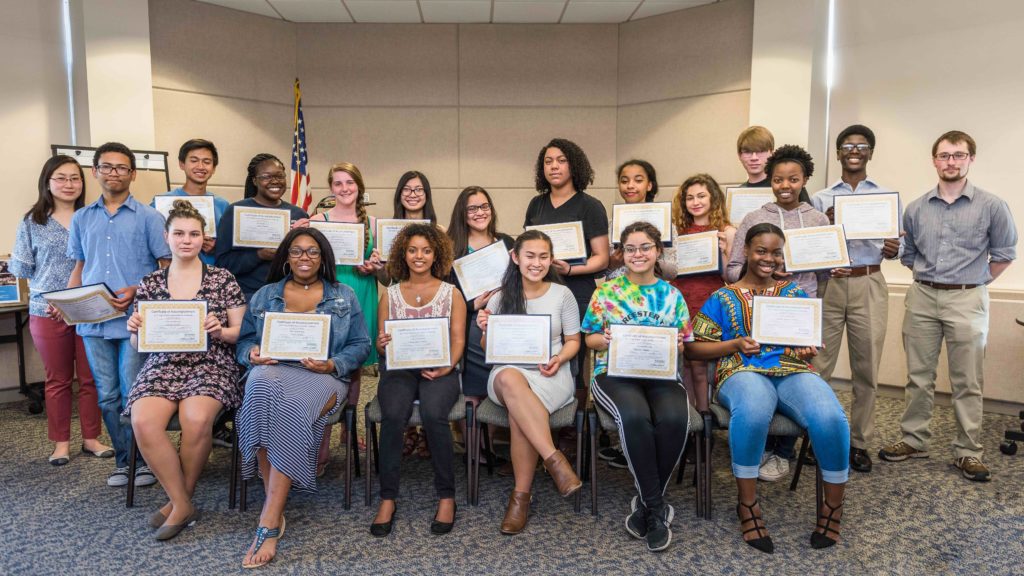Building Futures in Bioengineering and the Bioeconomy
There’s a growing movement in the biotechnology industry, and especially in bioengineering fields, to bring workforce development into high schools. Dive into BioBuilder's recent efforts to open college and career options to students earlier than ever before.
BioBuilder is broadening the curriculum’s utility at the intersection of traditional education models and workforce development.
What is behind this investment of time to increase biotechnology awareness, you ask? The fact that the biotechnology industry continues to grow at warp speed. Recent research found biotechnology investments surged to $20 billion in 2018, and current biotechnologies are projected to have economic impacts of $4 trillion a year over the next 10 to 20 years, and will contribute more than one million U.S. jobs by 2030. More than half of these biotechnologies are in agriculture and food, consumer products and services, and materials and energy production. Biotechnology isn’t just for medical applications!
The need for bioengineering professionals is already great and continues to grow as the industry grows. Recognizing the pitfalls of lagging education in any burgeoning field, the biotechnology industry is partnering with educators to ensure the growing bioeconomy does not face a shortage of skilled workers. The employee needs are diverse and include research, biocomputing and analytics, bioproduction, and more.
BioBuilder Leadership
BioBuilder is the curriculum leader for bioengineering and synthetic biology, offering the only comprehensive curriculum for students and teachers alike. One example of this leadership-in-action is the partnership between BioBuilder and the Worcester, Massachusetts Public Schools. The partnership began in 2017 when 17 Worcester-area high school students completed BioBuilder’s High School Apprenticeship Challenge in which they learned laboratory skills that they then used in paid summer internships at University of Massachusetts Medical School and the Worcester Polytechnic Institute (WPI).

Fast forward to 2021, and Worcester students will have a new opportunity for workforce development through the Massachusetts Innovation Pathway Program (IPP). IPP is an early career program that provides high school students with advanced studies focused on a particular field, including Biomanufacturing and Environmental and Life Sciences, along with opportunities for internships. The IPP and BioBuilder Apprenticeship Challenge are both based on industry input about required knowledge and skills, so students are indeed gaining valuable workforce development.

Another initiative in which BioBuilder is active is the BioMADE™ Bioindustrial Manufacturing Innovation Institute. BioMADE’s mission is “to enable domestic bioindustrial manufacturing at all scales, develop technologies to enhance U.S. bioindustrial competitiveness, de-risk investment in relevant infrastructure, and expand the biomanufacturing workforce to realize the economic promise of industrial biotechnology.” BioBuilder is the K-12 voice for BioMADE and was the only K-12 member participant in the April 2021 BioMADE launch.
Dr. Kuldell's Expertise
Dr. Natalie Kuldell is a highly regarded educator and curriculum developer who joined the Massachusetts Institute of Technology (MIT) when it was developing its new major in Biological Engineering. Prior to that she studied Chemistry as an undergraduate at Cornell, and Microbial Genetics at Harvard Medical School as a graduate student and post-doc. She began her teaching career at Wellesley College before joining the Department of Biological Engineering at MIT in 2003.
Dr. Kuldell is a recognized leader in bioengineering education and practice, and has been recognized as such by many scientific and educational organizations. Most recently, in April, Dr. Kuldell was asked to develop a paper for the Day One Project: Meeting Biology’s “Sputnik Moment”: A Plan to Position the United States as a World Leader in the Bioeconomy. SynBioBeta then invited her to speak about her paper in May 2021.
Dr. Kuldell’s involvement with organizations such as these makes her the ideal link back to K-12 schools in their efforts to provide meaningful, bioengineering workforce development experiences for their students.
Leading Into the Future
BioBuilder is committed to promoting and supporting the future of the U.S. bioeconomy. They are using the IPP model and their work with the WPS to pursue similar programs in Massachusetts and around the country. BioBuilder’s goal is to develop an adaptable model for training students with the essential skills to pursue biomanufacturing careers and make informed decisions about college and beyond.

